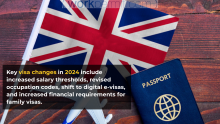Support migrant centric journalism today and donate

The Supreme Court of Canada has ruled that two would-be immigrant families with disabled children should be allowed into Canada. The court ruled those children will not place "excessive demands" on social-support systems.
The ruling could force substantial changes in the way immigration officials deal with applicants who have health problems and disabilities, or who have family members with medical problems.
The top court tossed out rulings that had prevented two families -- one from South Africa and one from the Netherlands -- from coming to Canada.
In one case, the Hilewitz family wanted to immigrate from South Africa with a son in his 20s who is mildly retarded. The family promised to pay privately for special services, but Immigration Department officials refused the application, saying the rules prevented them from considering the factor of private wealth.
The other case involved the de Jong family, who wanted to come from the Netherlands to buy a dairy farm in Southern Ontario. Their daughter is mildly retarded.
The family said they would send her to a private Christian school that had agreed to provide special education at no cost to the public.
Both families were denied entry under the "excessive demands" provisions of the Immigration Act, which say people will not be allowed into the country if they would be a drain on the social-welfare system.
A ruling written by Madam Justice Rosalie Abella and endorsed by seven of the nine Supreme Court judges said it seemed "somewhat incongruous" that the wealth that allowed these families to qualify for entry into Canada was then ignored in determining whether their children would be a drain on social systems.
The court sent the two applications back to the Minister of Citizenship and Immigration for consideration by different visa officers.
Judge Abella said it is perfectly reasonable for Canada's immigration policy to ensure the country isn't exposed to "undue burdens" from immigrants. But she said that in these cases, the rules were interpreted to bar "all persons who are intellectually disabled, regardless of family support or assistance. . . ."
The two dissenting judges said the families should not be allowed into Canada because the law makes it clear that medical admissibility is separate from economic considerations.
Cecil Rotenberg, the immigration lawyer who took the case to the top court for the two families, described the decision as a "complete and total victory" for those who were trying to get the Immigration Department to change the way it judges applicants.





















